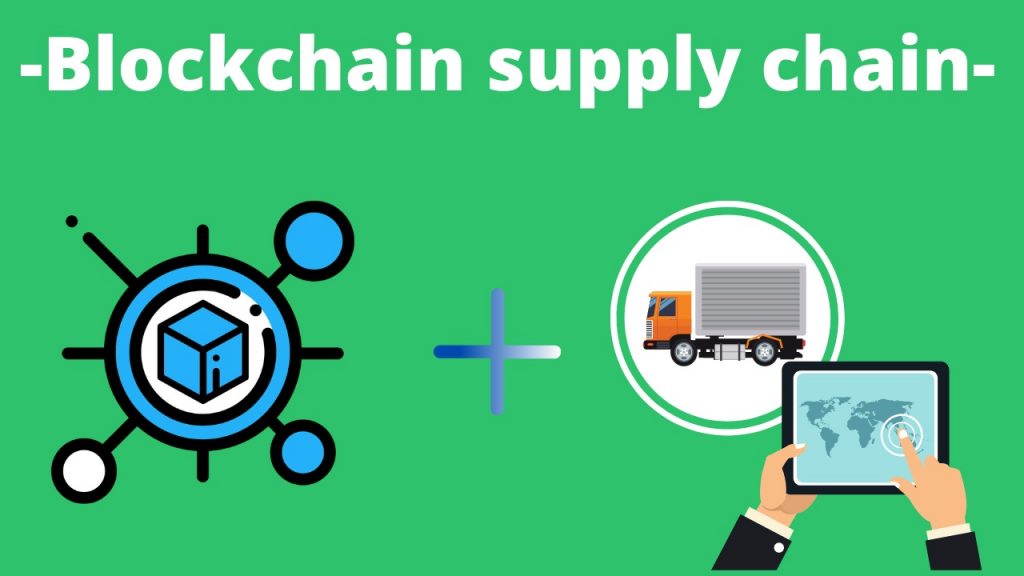Blockchain And Supply Chain

IT technologies are now developing at a tremendous speed. Many decisions give impetus to the improvement of work in many other industries. The blockchain supply chain will be the perfect solution for any company that has a logistics department. Practice shows that innovative technologies can completely change the world, create more favorable conditions for cooperation, and simplify many works that previously required a lot of time and effort.
Blockchain in the supply chain
Even though blockchain is a technology initially associated with digital currencies, it has become prevalent in many other industries. Today, we can confidently say that blockchain can take a rather important place in logistics, and interest is snowballing. For example, in 2019, a study was conducted in which the heads of large logistics companies around the world were interviewed. 24% of them admitted that they are already using, testing, or simply planning to use blockchain technology to improve supply chains. In 2020, 55% of heads and executives of logistics companies saw blockchain implementation as their priority for the next few years.
It is worth noting that these words are straightforward to believe when you look at the growth of blockchains in supply chain. It is projected to reach $ 3 billion by 2026. Let's try to find out what this technology is, how it can improve supply chains and the benefits of using it in logistics.
Blockchain can conduct audits and inventories, monitor the state of capital, monitor bank invoices, and even provide a range of other services.
What is blockchain?
Today blockchain is one of the most talked-about topics in the IT community. However, not everyone fully understands what it is and how it works.
So, blockchain is a distributed database. It was initially developed and widely used for cryptocurrencies, but gradually it became clear that it would be beneficial for many other industries.
Blockchain is capable of storing vast amounts of data. Each information is stored in a separate chain. All of them are interconnected. The information is stored here unchanged. No one, even the data owner, can change this. As a result, this leads to increased trust. All data in one block is recorded in chronological order, which allows you to view the dynamics and quickly navigate the information.
You can set up the blockchain so that all data is registered here automatically. For example, you can connect it to artificial intelligence or robotics equipment. In this case, data on the formation of parcels, fuel use, and much more will immediately register on the network. It simplifies the work of many departments and allows you to get the most accurate information.
In addition, blockchain-based applications can log data and perform several other jobs. For example, you can conduct financial transactions (using crypto and fiat currencies), renegotiate contracts, make regular purchases, and much more.
In general, you can create unique software for any company based on its needs. Blockchain supply chain management allows you and your employees to shift most of the responsibilities to computer technology and do more essential things.
Blockchain advantages
Summarizing all of the above about blockchain, there are several advantages of this technology:
- Decentralization;
- Automation;
- Ability to use cryptocurrencies;
- Safety;
- Increased confidence.
The above benefits will hold for any blockchain-based software, regardless of the industry in which they are used.
Blockchain architecture
Blockchain is a relatively large network. Multiple computers, laptops, or even mobile devices must be used for the database to function properly. Each of them gets access to the blockchain.
All devices that are connected to the system are called nodes. Each of them stores an exact copy of the entire blockchain and performs additional operations, such as verifying transactions. As a result, all nodes should have as much storage as possible and performance.
The more such nodes there are, the more secure the system becomes, the more difficult it is for attackers to hack into it. However, many nodes can significantly delay the system operation, which brings specific difficulties. All nodes must be constantly on and have access to the Internet. If a node fails for more than one hour, the entire system will have quite significant difficulties.
How can blockchain be used in supply chains?

Blockchain for supply chain can make a huge difference. The supply chain is a fairly broad definition - some independent companies are involved in sourcing materials, production of products, and their physical distribution for end customers. For the whole system to work harmoniously, it is necessary to have a shared resource.
Let's take a look at a simple example. Let's say your company is engaged in the production of books. You need to receive paper, paints, and other goods regularly for the company's regular operation. In addition, you want to involve the editors to proofread the texts for errors. It would be best if you also took care of finished product sales, logistics, and many other issues. The blockchain can control all supplies of raw materials, keep track of stock balances and even leave orders to suppliers to purchase new raw materials. The blockchain will consider how much raw material was spent, the speed of order execution, and the number of scraps during the production of books. The data obtained can be used to calculate the cost of production and issue bonuses to your employees. Once the books are printed, they are redirected to the warehouse. Blockchain can keep track of finished products in a warehouse. If your printing house has its own logistics department, then the blockchain will help you find the best route, control fuel consumption and allow you to track the cargo in real-time.
If you have been working with your partners for a long time and there is already a certain level of trust between you, you can connect one blockchain to several companies. So, for example, the editorial office will be able to immediately receive texts for verification and send a report on the work done; the logistics company will control the readiness of products and transmit data on the time and conditions of delivery. So, thanks to the blockchain, several companies or departments of one company will work as a single mechanism.
Analyzing the presented example, we can say that the Blockchain and supply chain together can establish the work of almost any company engaged in the production or delivery of goods. Naturally, different companies are needed; it is necessary to develop unique software to bring more benefits.
What are smart contracts?
The supply chain blockchain uses smart contracts quite often. These are electronic agreements that can change the way you think about partnerships. Many companies conclude contracts with their partners; if you fulfill your obligations, you have to go to court. It leads to the fact that you lose a considerable amount of time, effort, and money and do not always get a positive result.
Smart contracts can solve this problem. You enter certain conditions under which the transaction can take place. As soon as the parties have fulfilled all obligations, money is automatically debited from the account in favor of the manufacturer of goods or services. It helps prevent fraud, increases trust between users, and solves many problems.
Nevertheless, smart contracts have two significant drawbacks: this technology still needs to be improved, it has vulnerabilities, and all processes here are irreversible. For example, money will be debited from your account as soon as the product supplier has sent you the goods. When the goods arrived at the warehouse, you found that the goods were of poor quality. And you will not be able to return the money if the supplier turns out to be dishonest or is not interested in further cooperation with you.
In general, if you have been working with partners for a long time, smart contacts will be able to automate many processes, simplify the process of joint work on projects and improve trust relationships.
Benefits of using blockchain in supply chains

Blockchain in supply chain management has many advantages:
- Increased confidence. Because all data in the system is unchanged and is often recorded automatically by various devices, there is no reason for suppliers to compete in their correctness. Also, the level of trust increases the use of smart contracts.
- Efficiency. All company departments can receive the information necessary for their work and use it. It improves communication between departments. In addition, you can configure the blockchain in such a way as to control the amount of work performed per day by each employee. It will help identify the weak link, prevent idleness in the workplace and increase the efficiency of each individual.
- Transparency. You can decide which data from the blockchain will be available to everyone and only a narrow circle of people.
Every firm that has already tried out the blockchain and implemented it in their work knows that this technology can radically change the idea of creating and maintaining supply chains.
Disadvantages of using blockchain in supply chains
Blockchain logistics also has several disadvantages:
- Requires expensive equipment;
- The creation of software for the needs of the company is expensive;
- The technology is complicated to understand;
- The speed of transactions is lower than that of other payment systems or banks.
Since most of the information about supply chains must be kept private, retailers should use authorized registries, and their security is slightly worse than unauthorized ones.
A few examples
There are several large blockchain supply chain companies today. They have already appreciated all the advantages of this technology and are ready to share their experience.
We propose to consider two fairly well-known examples. So, the American pharmaceutical company Pfizer used the blockchain to secure the supply of the Covid-19 vaccine to different countries. It made it possible to show most transparently the shipment of vaccines, the quantity in the batch, the total cost, as well as to track the cargo in real-time, whether the storage requirements during transportation are met, and much more. Overall, blockchain has helped build trust and organize the process as a whole.
Another well-known American company Amazon has been using blockchain for a long time. Here, it helps keep track of goods in the warehouse and establishes logistics. Recall that Amazon is the world's largest trading platform; such results have been achieved thanks to artificial intelligence, robotics, many warehouses, and blockchain.
In addition, you can find many examples of how blockchain technologies are used in various startups. For instance, Provenance, a supply chain transparency startup, recently completed a six-month pilot project to track responsible tuna sourcing using blockchain.
It is assumed that innovative solutions based on blockchain will appear more and more often; this technology may change the approach to creating supply chains and establishing logistics, which has been experiencing specific difficulties lately.
Conclusion
Blockchain is gradually gaining more popularity in various fields, but it can do as much for supply chains as it does for the cryptocurrency industry. With its help, you can control all the processes in the company, build trust with partners, automate many processes and increase efficiency.
Modern technologies allow you to build an application on a database to perform various tasks, depending on what kind of business you are in, how you have established the work of logistics departments, what issues need to be addressed. Do not be afraid to use innovative technologies, and you will immediately notice how your company will change for the better.
